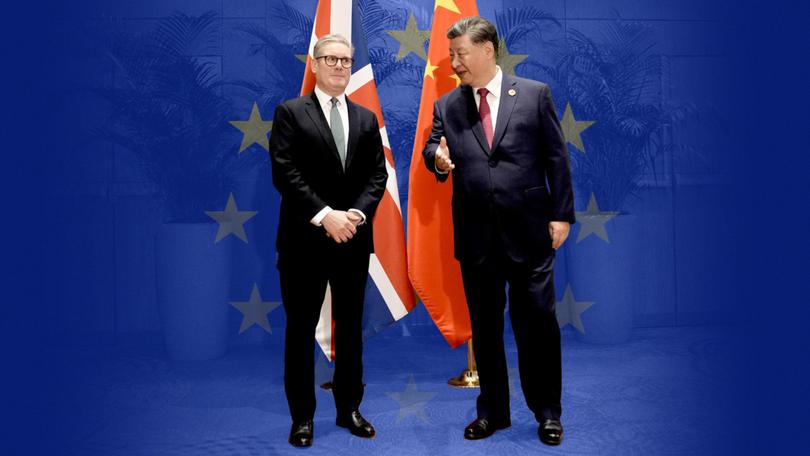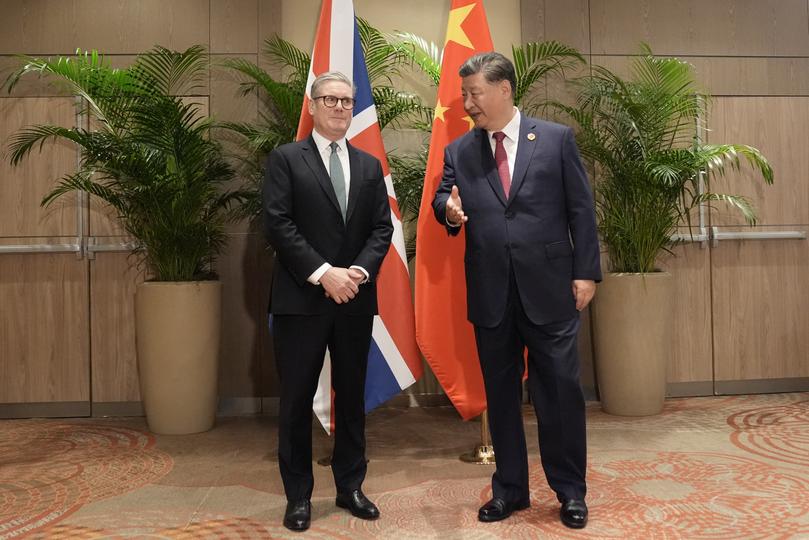LATIKA M BOURKE: Starmer’s Sino pledge as British and Chinese leaders meet for first time since pre-COVID
LATIKA M BOURKE: Immediately after Brexit, Sir Keir Starmer spent years campaigning for a second referendum wanting the UK to rejoin the European Union, now in a post-COVID world he plays a different hand.

Immediately after Brexit, Sir Keir Starmer spent years campaigning for a second referendum wanting the UK to rejoin the European Union.
Ironically, if the Labour leader had been successful, he would have been forced by Brussels into adopting a far tougher China policy than the one he’s overseeing as prime minister.
On Monday, the UK leader met China’s Xi Jinping for the UK and China’s first leader bilateral meeting since 2018.
Sign up to The Nightly's newsletters.
Get the first look at the digital newspaper, curated daily stories and breaking headlines delivered to your inbox.
By continuing you agree to our Terms and Privacy Policy.Much has changed since Theresa May was prime minister. The pandemic exposed China’s willingness and ability to infect the world with a virus it knew was contagious yet allowed to escape its borders.
That decision killed millions and caused incalculable economic, mental and social damage which governments and citizens are still paying for to this day, while China brazenly seeks to fashion itself as the leader of the Global South and developed countries bleat meaningless soundbites about wanting to cooperate with Beijing on global health issues.
The crackdown on Hong Kong showed Beijing’s assurances made in international agreements could not be trusted, just as China’s build-up of military outposts in the South China Sea showed Xi’s 2015 Rose Garden pledge that “China does not intend to pursue militarisation” of the Spratley Islands to be a lie.
Further, the CCP’s economic coercion of Australia demonstrated that the Chinese Government was willing to use its trading dominance to punish the citizens of countries with governments who voiced political positions it did not like.
And the United States flexed its muscle to force the British into banning Huawei technology from its telecommunications networks.
Finally, China has been an active supporter of Russia’s invasion of Ukraine and has supplied it with dual-use goods to prop up its war effort and economy.
As a result, the G7, of which the UK is a member has vowed to follow Brussels’ path of “derisking” its critical supply lines from Beijing.
For the European Union, this has meant imposing tariffs on Chinese state-subsidised electric vehicles to enable European carmakers to try and compete, raiding the European offices of baggage-scanning company Nuchtech, using a new regulation to investigate Chinese-subsidised medical devices and designating the fast fashion retailer Shein as a Very Large Online Platform exposing it to tougher regulation, including the requirement to rid its platform of counterfeit goods.
It has investigations open into Chinese-subsidised wind turbine parks in Spain, Greece, France, Romania and Bulgaria, solar panels in Romania and has forced a Chinese state-owned company to withdraw from bidding to build trains for Bulgaria.

So what did Sir Keir, who if he had his way would have Britain back inside the European Union, do when he met Mr Xi by comparison?
His approach has always been an enigma but on Monday, he finally showed his hand.
“A strong UK-China relationship is important for both our countries,” Sir Keir told Mr Xi.
According to the official readout from Downing Street, Sir Keir told Mr Xi that he wanted to deepen trade and investment and work together more on health, education and other areas of mutual interest.
“The prime minister set out that our approach would be consistent, respectful and pragmatic in order to advance these shared goals,” a Downing Street spokesman said.
